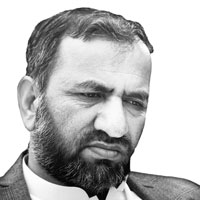If nothing else, Joe Biden got the attention of the Afghan insurgents. “Look,” the U.S. vice president tells Newsweek’s Leslie H. Gelb in the magazine’s latest issue, “the Taliban per se is not our enemy. That’s critical. There is not a single statement that the president has ever made in any of our policy assertions that the Taliban is our enemy because it threatens U.S. interests.” Active and former members of the group’s senior leadership have one question: why didn’t the White House say so sooner?
Even now, after a decade of fighting the Americans, the group’s leaders tend to say they have nothing against the United States as a country—although they remain as committed as ever to resisting the U.S. occupation of their homeland. “We are not natural enemies of each other,” says Khazi Habibullah Fauzi, who served as the Taliban’s charge d’affaires in Saudi Arabia before the U.S. invasion of Afghanistan. “We became enemies because of an external factor—namely Osama bin Laden, who was not an Afghan. Now he is gone, and the Taliban have little or nothing to do with al Qaeda.”
The vice president’s remarks provoked blasts of outrage at home and in Kabul. Instead, for once it was senior Taliban figures who responded calmly—which may ultimately be a positive sign as the Americans try to reach a peaceful settlement in Afghanistan. Fauzi, for one, welcomes the remarks as a possible sign of a change of heart in Washington. “Biden’s statement shows that the U.S. is finally seeing us after 10 years of war with a cool head, not with emotion and cries for revenge that drove the U.S. after 9/11,” says the Afghan, who now lives in Kabul but remains in contact with the Taliban as a member of the Kabul government’s High Peace Council.

An active Taliban operative and former senior official agrees. He says he only wishes a serving U.S. vice president had made a similar comment a decade earlier, when it was possible for the two countries to avoid a destructive conflict. “If just after 9/11 the U.S. had said, ‘You are not my enemy, but only my enemy is in your territory,’ that could have made all the difference,” says the insurgent official, declining to be named for security reasons. Maybe then, he says, “there could have been the possibility of a natural understanding.”
Perhaps, he suggests, the Taliban’s supreme leader would have been more flexible if he and his regime had not been under an existential threat from Washington. After all, the operative says, it’s a matter of record that Mullah Mohammed Omar saw the Saudi terrorist in his midst as a troublemaker but felt powerless to banish him.
Mullah Omar is famously quoted as saying bin Laden was like a chicken bone caught in his throat: he couldn’t swallow it, but couldn’t cough it up either. But the Taliban leader couldn’t find a country that would accept bin Laden without imprisoning or killing him, and Omar miscalculated badly in allowing the Saudi to remain in Afghanistan. “The current war is the result of minor Taliban mistakes and the lack of American tolerance and patience,” says Fauzi. “That’s what made us enemies.” “Punishing us for Osama’s presence was not justice,” the active Taliban official adds.
Even during their headiest days in power, the Taliban never had hostile designs or ambitions against America, the operative emphasizes. “We are not a worldwide movement,” he says. “Our focus is totally on Afghan territory. Ninety-nine percent of Taliban couldn’t even find the U.S. on a map.” He adds that al Qaeda has little or nothing to do with the Taliban nowadays. “There are zero percent of al Qaeda in Afghanistan now in the territory we control,” he says. “Al Qaeda has done nothing since the collapse of the Taliban from Afghan territory.” He conveniently ignores the chief reason that al Qaeda has been unable to launch new attacks on America from Afghan soil: the presence of the U.S. military in Afghanistan.
But not surprisingly the Taliban are also deeply embittered by Biden’s statement. “Biden is talking both sense and nonsense—if we are not your enemies, then what are you doing in Afghanistan?” the operative complains. “Is this some kind of joke, to say we are not your enemy after you occupy our country, imprison us in cages, and kill tens of thousands of our people? We didn’t invite you here, and we never wanted to become your enemy.”
Taliban fighters in the field take an even tougher stance. “When I first heard the statement I laughed,” says a 30-ish Taliban subcommander from southern Afghanistan. “I wondered if this was an American joke.” He and others are far from ready to forgive and forget. “You are only saying we are not enemies now because we have put up such a strong and unbeatable resistance,” the subcommander says. “Before 9/11, I didn’t hate America, But after ten years of war, after the bombings and atrocities, I now think the U.S. is enemy No. 1. And I’m proud to say that.”
Nevertheless, the group’s leaders seem to welcome Biden’s apparent overture, and they’re studying it. So far there has been no official public reply from the Taliban’s usually quick and voluble official spokesmen. “The senior levels of the Taliban are taking his statement very seriously,” says another former senior Taliban diplomat. “But it’s hard to forget 10 years of bloodshed and fighting.”
There’s no hurry. As Biden makes clear in his interview, America still isn’t ready to abandon the Kabul government. “If, in fact, the Taliban is able to collapse the existing government, which is cooperating with us in keeping the bad guys from being able to do damage to us, then that becomes a problem for us,” Biden says. The Taliban may not be America’s enemies—despite their human-rights record. But peace remains a long way off.






